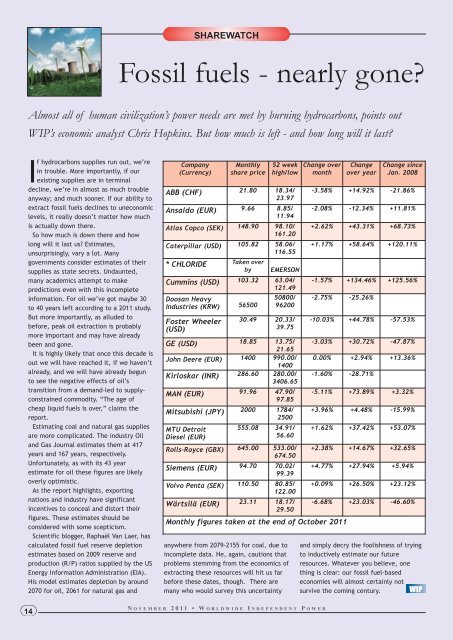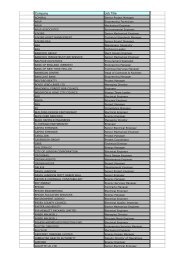FREE ENTRY - Global Media Publishing Ltd. - UK.COM
FREE ENTRY - Global Media Publishing Ltd. - UK.COM
FREE ENTRY - Global Media Publishing Ltd. - UK.COM
Create successful ePaper yourself
Turn your PDF publications into a flip-book with our unique Google optimized e-Paper software.
If hydrocarbons supplies run out, we’re<br />
in trouble. More importantly, if our<br />
existing supplies are in terminal<br />
decline, we’re in almost as much trouble<br />
anyway; and much sooner. If our ability to<br />
extract fossil fuels declines to uneconomic<br />
levels, it really doesn’t matter how much<br />
is actually down there.<br />
So how much is down there and how<br />
long will it last us? Estimates,<br />
unsurprisingly, vary a lot. Many<br />
governments consider estimates of their<br />
supplies as state secrets. Undaunted,<br />
many academics attempt to make<br />
predictions even with this incomplete<br />
information. For oil we’ve got maybe 30<br />
to 40 years left according to a 2011 study.<br />
But more importantly, as alluded to<br />
before, peak oil extraction is probably<br />
more important and may have already<br />
been and gone.<br />
It is highly likely that once this decade is<br />
out we will have reached it, if we haven’t<br />
already, and we will have already begun<br />
to see the negative effects of oil’s<br />
transition from a demand-led to supplyconstrained<br />
commodity. “The age of<br />
cheap liquid fuels is over,” claims the<br />
report.<br />
Estimating coal and natural gas supplies<br />
are more complicated. The industry Oil<br />
and Gas Journal estimates them at 417<br />
years and 167 years, respectively.<br />
Unfortunately, as with its 43 year<br />
estimate for oil these figures are likely<br />
overly optimistic.<br />
As the report highlights, exporting<br />
nations and industry have significant<br />
incentives to conceal and distort their<br />
figures. These estimates should be<br />
considered with some scepticism.<br />
Scientific blogger, Raphaël Van Laer, has<br />
calculated fossil fuel reserve depletion<br />
estimates based on 2009 reserve and<br />
production (R/P) ratios supplied by the US<br />
Energy Information Administration (EIA).<br />
His model estimates depletion by around<br />
2070 for oil, 2061 for natural gas and<br />
14<br />
SHAREWATCH<br />
Fossil fuels - nearly gone?<br />
Almost all of human civilization’s power needs are met by burning hydrocarbons, points out<br />
WIP’s economic analyst Chris Hopkins. But how much is left - and how long will it last?<br />
Company<br />
(Currency)<br />
Monthly<br />
share price<br />
52 week<br />
high/low<br />
ABB (CHF) 21.80 18.34/<br />
23.97<br />
Ansaldo (EUR) 9.66 8.85/<br />
11.94<br />
Atlas Copco (SEK) 148.90 98.10/<br />
161.20<br />
Caterpillar (USD) 105.82 58.06/<br />
116.55<br />
* CHLORIDE Taken over<br />
by EMERSON<br />
Cummins (USD) 103.32 63.04/<br />
121.49<br />
Doosan Heavy<br />
Industries (KRW)<br />
Foster Wheeler<br />
(USD)<br />
56500<br />
50800/<br />
96200<br />
30.49 20.33/<br />
39.75<br />
GE (USD) 18.85 13.75/<br />
21.65<br />
John Deere (EUR) 1400 990.00/<br />
1400<br />
Kirloskar (INR) 286.60 280.00/<br />
3406.65<br />
MAN (EUR) 91.96 47.90/<br />
97.85<br />
Mitsubishi (JPY) 2000 1784/<br />
2500<br />
MTU Detroit<br />
Diesel (EUR)<br />
555.08 34.91/<br />
56.60<br />
Rolls-Royce (GBX) 645.00 533.00/<br />
674.50<br />
Siemens (EUR) 94.70 70.02/<br />
99.39<br />
Volvo Penta (SEK) 110.50 80.85/<br />
122.00<br />
Wärtsilä (EUR) 23.11 18.17/<br />
29.50<br />
anywhere from 2079-2155 for coal, due to<br />
incomplete data. He, again, cautions that<br />
problems stemming from the economics of<br />
extracting these resources will hit us far<br />
before these dates, though. There are<br />
many who would survey this uncertainty<br />
Change over<br />
month<br />
N OVEMBER 2011 • WORLDWIDE I NDEPENDENT P OWER<br />
Change<br />
over year<br />
Change since<br />
Jan. 2008<br />
-3.58% +14.92% -21.86%<br />
-2.08% -12.34% +11.81%<br />
+2.62% +43.31% +68.73%<br />
+1.17% +58.64% +120.11%<br />
-1.57% +134.46% +125.56%<br />
-2.75% -25.26%<br />
-10.03% +44.78% -57.53%<br />
-3.03% +30.72% -47.87%<br />
0.00% +2.94% +13.36%<br />
-1.60% -28.71%<br />
Monthly figures taken at the end of October 2011<br />
-5.11% +73.89% +3.32%<br />
+3.96% +4.48% -15.99%<br />
+1.62% +37.42% +53.07%<br />
+2.38% +14.67% +32.65%<br />
+4.77% +27.94% +5.94%<br />
+0.09% +26.50% +23.12%<br />
-6.68% +23.03% -46.60%<br />
and simply decry the foolishness of trying<br />
to inductively estimate our future<br />
resources. Whatever you believe, one<br />
thing is clear: our fossil fuel-based<br />
economies will almost certainly not<br />
survive the coming century. WIP

















